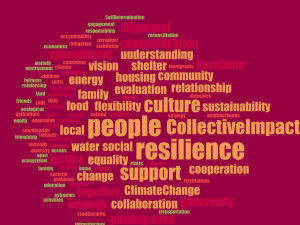Collaborating for Greater Impact
The Cowichan Climate Hub is an evolving local collaboration working on local solutions to the climate emergency while strengthening community resilence and social cohesion as part of our responses to climate change in the Cowichan Region. After all, we’re all in this together.
 Communities everywhere are experiencing the increasing impacts and stress of climate destabilization. Vulnerable citizens – children, poor and frail seniors, the homeless and low income families with fewer resources and less mobility – are and will be especially challenged to respond and adapt. To develop adaptive solutions that meet the needs of everyone in the Cowichan region we need to work together, strengthening our ability to co-operate within & between sectors & among neighbors, and collaborate across local governments, First Nations, social benefit and environmental non-profits, business, faith groups & others.”
Communities everywhere are experiencing the increasing impacts and stress of climate destabilization. Vulnerable citizens – children, poor and frail seniors, the homeless and low income families with fewer resources and less mobility – are and will be especially challenged to respond and adapt. To develop adaptive solutions that meet the needs of everyone in the Cowichan region we need to work together, strengthening our ability to co-operate within & between sectors & among neighbors, and collaborate across local governments, First Nations, social benefit and environmental non-profits, business, faith groups & others.”
One of the approaches we take is called “Collective Impact” – an approach aimed at helping groups and communities address complex issues together. We’re learning and working together with others as a part of the Tamarack Institute’s Climate Transitions Cohort. Check out the Climate Hub’s Facebook Page.
Here’s a link to a public lecture “A Conversation on Climate Change: The Inconvenient Truths of Our Time & How to Talk About Them” and discussion with the Canadian Centre for Policy Alternatives Climate Justice Director Marc Lee and communications specialist Cara Pike at at VIU Cowichan Campus lecture theatre.
I

